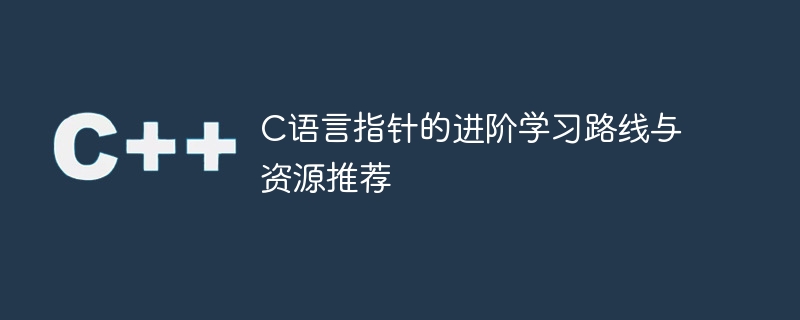Home >Backend Development >C++ >In-depth study guide and study material recommendations for C language pointers
In-depth study guide and study material recommendations for C language pointers
- WBOYWBOYWBOYWBOYWBOYWBOYWBOYWBOYWBOYWBOYWBOYWBOYWBOriginal
- 2024-02-19 22:50:061279browse

Advanced learning route and resource recommendations for C language pointers
Introduction:
C language is a programming language widely used in system programming and embedded development language. In the C language, pointers are a powerful and complex concept that provide programmers with the ability to directly access memory addresses, making it possible to process data more flexibly and efficiently during programming. Mastering the use of pointers is very critical for C language learning and project development.
This article will introduce you to the advanced learning route of C language pointers, and recommend some high-quality learning resources, covering basic concepts and practical applications.
1. Basic knowledge
1. Concept and basic operations of pointers
- Learn the concept and basic syntax of pointers, understand the relationship between pointers and memory addresses, and master the functions of pointers Declaration and initialization methods, as well as the usage and meaning of basic operators (& and *).
-
Sample code:
int main() { int num = 10; int *ptr = # *ptr = 20; printf("%d ", *ptr); return 0; }
2. Pointers and arrays
- Learn the relationship between pointers and arrays, and understand pointers Convert to and from arrays, as well as the access methods of pointers to arrays, and master the pointer arithmetic of pointers and arrays.
-
Sample code:
int main() { int arr[5] = {1, 2, 3, 4, 5}; int *ptr = arr; for (int i = 0; i < 5; i++) { printf("%d ", *ptr); ptr++; } return 0; }
3. Pointers and strings
- Learn the relationship between pointers and strings, Understand the conversion between pointers and strings, as well as how pointers access and operate strings, and master the role of pointers in string processing.
-
Sample code:
int main() { char str[20] = "Hello, World!"; char *ptr = str; while (*ptr) { printf("%c", *ptr); ptr++; } return 0; }
2. Advanced Applications
1. Pointers and dynamic memory allocation
- Learn the concept of dynamic memory allocation and common functions (such as malloc, calloc, realloc and free), understand the role and use of pointers in dynamic memory allocation, and master the principles and precautions of dynamic memory allocation.
-
Sample code:
int main() { int n; scanf("%d", &n); int *arr = (int *)malloc(n * sizeof(int)); // do something with the dynamically allocated memory free(arr); return 0; }
2. Pointers and structures
- Learn the relationship between pointers and structures, understand the pointers In view of the access and operation methods of structures, be familiar with the dynamic memory allocation of pointers and structures, and master the comprehensive application of pointers and structures.
-
Sample code:
typedef struct { int x; int y; } Point; int main() { Point *ptr = (Point *)malloc(sizeof(Point)); ptr->x = 10; ptr->y = 20; printf("%d %d ", ptr->x, ptr->y); free(ptr); return 0; }
3. Recommendation of high-quality learning resources
1. "C Programming Language" (Brian W. Kernighan, Dennis M . Ritchie)
- This is a classic in the field of C language and is very helpful for learning C language and pointers. The content of this book is detailed, the ideas are clear, and a large number of example codes are provided.
2. "C Language Programming" (Tan Haoqiang)
- This is a very classic textbook, suitable for beginners. It is characterized by the combination of theoretical knowledge and practical cases, detailed and thorough explanations of pointers, and a large number of sample codes and exercises.
3. Baidu C language pointer tutorial (https://www.baidu.com)
- Baidu search engine provides a large number of C language pointer tutorials, covering All levels and aspects of knowledge. You can choose suitable resources for learning according to your own needs.
Summary:
Through the study of this article, we have introduced in detail the advanced learning route and resource recommendations for C language pointers. From basic knowledge to advanced applications, we learned the concept of pointers, basic operations, and the relationship between pointers and arrays, strings, dynamic memory allocation, and structures. At the same time, we also recommend some high-quality learning resources, hoping to help readers better master and apply C language pointers.
References:
- Brian W. Kernighan, Dennis M. Ritchie. C Programming Language.
- Tan Haoqiang. C Language Programming.
- https://www.baidu.com
The above is the detailed content of In-depth study guide and study material recommendations for C language pointers. For more information, please follow other related articles on the PHP Chinese website!
Related articles
See more- JavaScript Advanced (2) Referencing another JS file in one JS file
- How to generate random numbers in c language
- What are the rules for variable names in C language?
- The difference between golang references and pointers
- Detailed explanation of the difference between the receiver of a method in golang being a pointer and not being a pointer

